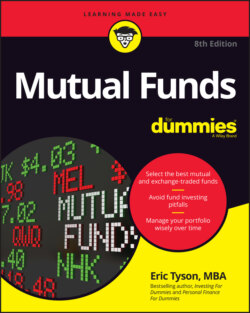Читать книгу Mutual Funds For Dummies - Eric Tyson - Страница 84
Know the drawbacks of investing in individual securities
ОглавлениеThe stock-picking cheerleaders cite plenty of reasons and make hyped claims to get you to invest in individual stocks. But they’re loath to mention the drawbacks of selecting and trading individual securities. You won’t buy their books and newsletters or visit their websites if they can’t promise you effortless riches, so you may not openly get the following information from the “stock-picking-is-easy” writers:
Stock picking takes significant research time and expense. Before buying an individual security (stock or bond), you should know a great deal about the company you’re investing in. Relevant questions that you need to answer includeWhat products or services does the company sell?What are the company’s prospects for future growth and profitability?How does the company’s performance compare to its competitors’ performances — both recently and over the long haul?Are technological or other changes in the works that might harm or improve its business?How much debt does the company have?You need to do your homework on these questions, not only before you make your initial investment but also on a continuing basis as long as you hold an investment. Gathering this information and accessing quality research on a company take time and money. And you have to conduct this legwork for every company that you consider investing in. That’s how Lynch filled up his marathon workweeks as a fund manager. Be honest with yourself. If you’re really going to research and monitor your individual securities, the extra work ultimately will take time away from other pursuits. In worst-case situations, I’ve seen busy people spend almost as many hours on the weekend and in the evenings with their portfolios as they do with family and friends. If you can really afford the time for this type of hobby, more power to you. But remember, no one I know of has ever said on his deathbed, “I wish I had spent more time watching my investments.” You only get one chance to live your life — once squandered, your time is gone forever.
Individual stocks offer less likelihood of diversification. Unless you have tens of thousands of dollars to invest in dozens of different securities, you probably can’t afford to develop a diversified portfolio. For example, when investing in stocks, you should hold stock in companies belonging to different industries, in different companies within an industry, and so on. Not properly diversifying adds to the risk of losing your shirt.
Individual stocks bring more accounting and bookkeeping chores. When you invest in individual securities outside retirement accounts, you must keep track of your purchase and dividend history (if you reinvest them). Every time you sell a specific security, you must report that transaction on your tax return.Even if you pay someone else to complete your tax return, you still have the hassle of keeping track of transactions. (On the plus side, however, you control selling decisions with individual securities; with funds, managers who trade can lead to capital gains distributions for you. As I discuss in Chapter 10, you can select mutual and exchange-traded funds that are tax friendly for your situation, including funds that are managed, so as to minimize or even eliminate capital gains distributions.)
